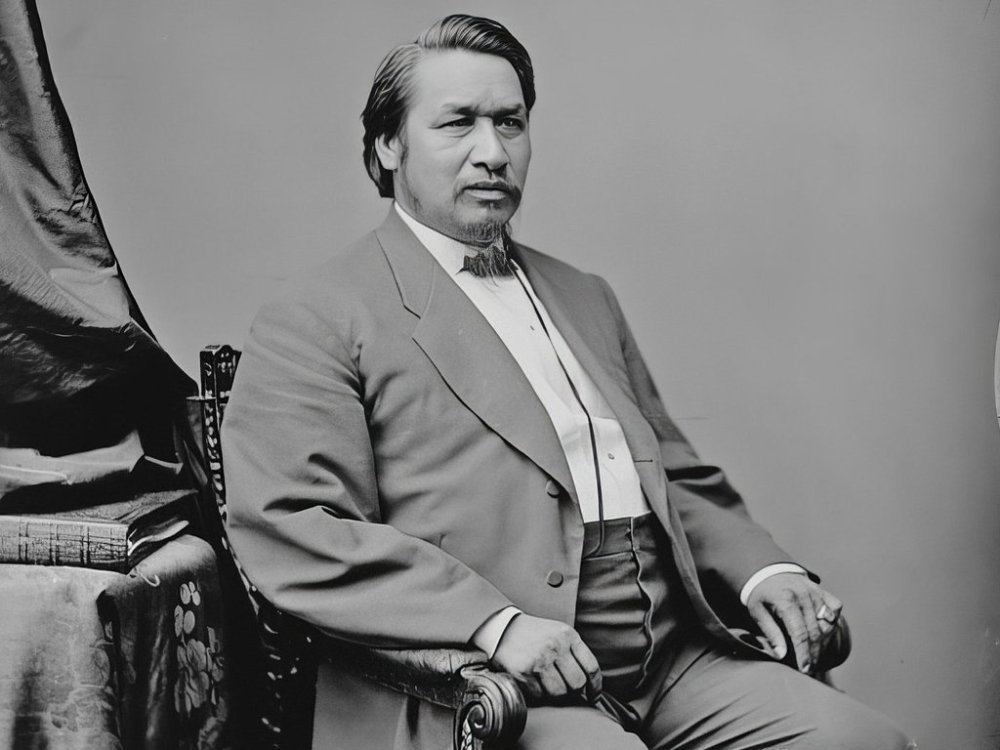Civil War general and Seneca leader Ely Samuel Parker posthumously admitted to New York State Bar
Advertisement
Read this article for free:
or
Already have an account? Log in here »
To continue reading, please subscribe:
Monthly Digital Subscription
$0 for the first 4 weeks*
- Enjoy unlimited reading on winnipegfreepress.com
- Read the E-Edition, our digital replica newspaper
- Access News Break, our award-winning app
- Play interactive puzzles
*No charge for 4 weeks then price increases to the regular rate of $19.00 plus GST every four weeks. Offer available to new and qualified returning subscribers only. Cancel any time.
Monthly Digital Subscription
$4.75/week*
- Enjoy unlimited reading on winnipegfreepress.com
- Read the E-Edition, our digital replica newspaper
- Access News Break, our award-winning app
- Play interactive puzzles
*Billed as $19 plus GST every four weeks. Cancel any time.
To continue reading, please subscribe:
Add Free Press access to your Brandon Sun subscription for only an additional
$1 for the first 4 weeks*
*Your next subscription payment will increase by $1.00 and you will be charged $16.99 plus GST for four weeks. After four weeks, your payment will increase to $23.99 plus GST every four weeks.
Read unlimited articles for free today:
or
Already have an account? Log in here »
BUFFALO, N.Y. (AP) — Ely Samuel Parker, a Seneca leader and Civil War officer who served in President Ulysses S. Grant’s cabinet, was posthumously admitted Friday to the New York State Bar, an achievement denied him in life because he was Native American.
His admission inside a ceremonial courtroom in Buffalo 130 years after his death followed a yearslong effort by his descendants, who saw bitter irony in the fact that an important figure in U.S. history was never seen as a U.S. citizen, then a requirement to practice law.
“Today … we correct that injustice,” Melissa Parker Leonard, a great-great-great-grandniece of Parker’s, said to an audience that included robed judges from several New York courts. “We acknowledge that the failure was never his. It was the law itself.”

Parker was at Grant’s side for Gen. Robert E. Lee’s 1865 surrender at the Appomattox, Virginia, courthouse, where he was tasked with writing out the final terms that the generals signed. Grant later chose Parker, by then a brigadier general, to be commissioner of Indian Affairs, making him the first Native American to serve in the position.
He is also the first Native American to be posthumously admitted to the bar, said retired Judge John Browning, who worked on the application.
“Even a cursory review of his biography will show that Mr. Parker was not only clearly qualified for admission to the bar, but he in fact exemplified the best and highest ideals of the legal profession that the bar represents,” Judge Gerald Whalen, the presiding justice of the 4th Appellate Division, said before finalizing the admission.
Parker was born on the Seneca Nation of Indians’ Tonawanda reservation outside Buffalo in 1828. He was educated at a Baptist mission school, where he went by Ely Samuel Parker instead of his Seneca name, Hasanoanda, and studied law at a firm in Ellicottville, New York. His admission to the bar was denied at a time when only natural-born or naturalized citizens could be admitted.
Native Americans were granted citizenship in 1924.
“Today is Ely’s triumph, but it is also all of ours, too,” said Lee Redeye, deputy counsel for the Seneca Nation of Indians, “for we stand victorious over the prejudice of the past.”
Unable to practice law, Parker became a civil engineer but continued to use his legal training to help the Seneca defend their land, partnering with attorney John Martindale to win victories in the New York Court of Appeals and U.S. Supreme Court.
But he is most widely recognized for his Civil War service, first serving as Grant’s military secretary. Parker and Grant had met and become friends in Galena, Illinois, where Grant had a home and where Parker, then an engineer for the U.S. Treasury Department, was supervising construction of a federal building.
Parker died in 1895 and is buried in Buffalo’s Forest Lawn Cemetery.
“This moment is deeply personal for our family. It allows Ely to rest in the knowledge that he did his best,” Leonard said Friday, “and that his best changed the course of our history.”

